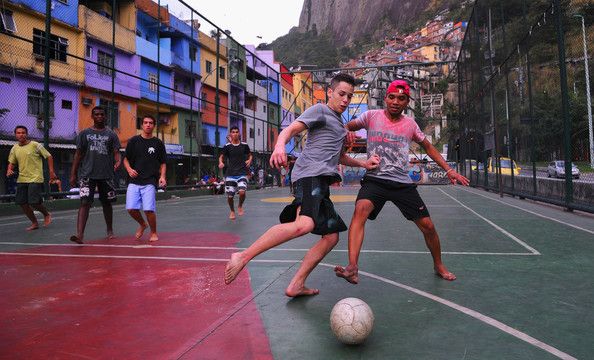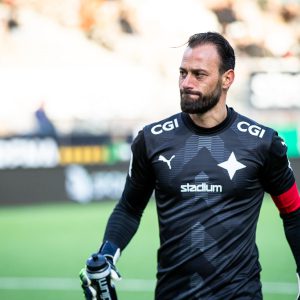

Soccer, a fun game like I used to know…
Every practice, we start with a small conversation with the players, asking how was the day, how’s school… Basically, to break the ice and also know if there’s any issue that can affect the holistic development of the players, and together with team, parents or teaches we can help.
This week, I decided to ask also something very simple, but something that can make a big difference in this kids dream.
Question was, “after we put the balls away in practice, how many times over the week you actually play soccer on your own or with friends?“
-I was not surprised, but shocked by the answers. Less than one third of the players play at school with friends or on their own, another third plays occasionally at school, and (a little more than) a third ONLY PLAYS SOCCER AT PRACTICE/GAME.
This question made me think about my “time” as a child, back in Portugal. The only two times of the day that I didn’t had a ball on my feet was when in bed to sleep, or when eating (my mom didn’t allowed playing inside the house). I was always playing outside, or with friends, or kicking the ball against a wall. I’ll watch all the games on TV, and come outside right away trying to recreate the moves from my favourite players.
“I don’t believe skill was, or ever will be, the result of coaches. It is a result of a love affair between the child and the ball.”
-Roy Maurice Keane
I had this conversation with lots of coaches and parents, and I always get the same answer: “Kids nowadays can’t play outside, Canada (North America) is too cold to be outside,etc…” not necessarily, there’s lots of little things that can be done, but for some reason is easier to drop the children in a “Structured environment” where in place having creativity, they have rules. In place of learning how to walk from crawl, they are introduced immediately to running, without being ready morphologically.
This early “adultorizing” of children’s learning environment is removing creativity, pleasure, and passion for the game.
“There’s got to be a cultural change from parents hovering over the kids and trying to prevent them from making mistakes, wanting them to do what they think is best for them by giving them instructions, pointing out obvious solutions that they can see, to help their kids be successful. ….It’s like giving a child a puzzle and telling them where to put the pieces because you don’t want them to make a mistake. When really what children do by trying different pieces of the puzzle, they learn how to put together a puzzle.” -Scott Gimble, American Youth Soccer Organization, Director of Development
As coaches there’s lots of different approaches that we can use to try to minimize this problem. Recreating a learning environment without reinforce the control encouraging outside activities, encouraging drop-off games (same facilities have this kind of games), using some constraints (be careful which constrains or you’ll end up in a structured environment), increasing playtime without over coaching over practices and use drop-off futsal games.
This are just some examples of what can be done to help getting players out of this controlled environment and expressing their interest and creativity.
Countries that used to be famous by creative players (like the South American) are nowadays suffering from this issues also. After talking with some Brazilians, Uruguayans and Argentine coaches and friends, everyone is “complaining” about the same, we’re losing “street soccer” and this structured playing time is affecting performance in the field afterwards.
This early specification will impact the creativity, but also the health of the children.
Sedentary habits are also on the raise.
A 2010 study by Kaiser Family Foundation found that the average kid in the 8–18 years age group, is spending an alarming seven hours in front of the screen (television, mobile, laptop) every day (this number increases year after year).
According to a study, Physical activity in childhood may be the key to optimizing lifespan skeletal health, published by the National Center for Biotechnology Information, in the year 2013, ‘an hour of outdoor play or engaging in a physical activity every day is extremely important for children. This may or may not be all at one go, but can be beneficial even when done in chunks of 15–20 minutes are beneficial in many ways. It helps them burn energy, tone the muscles and helps stimulate the brain. The human body is meant to move. So, any lack of physical activity deteriorates and weakens the body, sags the muscles and stiffens the joints and causes pain.’ According to Dr Rajeev K Sharma, Senior Consultant, Orthopedics and Joint Replacement Surgeon, Indraprastha Apollo Hospitals, “Although arthritis or the damage that sets up in our joints is considered a problem associated with ageing, we are now seeing a rise in number of younger patients grappling with osteoarthritis and other problems of the joints and ligaments. Loss of cartilage, depleting calcium, wear and tear of the ligaments and obesity all contribute to the onset of arthritis.”
I understand that society changed, and outside time is not as easy and possible as before, but we’re still in time to reverse this “robot mentality” and adopt a healthier lifestyle, soon climbing a tree is going to be considered radical sport.
“Your kids success, or lack of success in sports, does not indicate what kind of parent you are. But, having an athlete that is coachable, respectful, a great teammate, mentally tough, resilient, and who tries their best, is a direct reflection of your parenting.”
-Unknown
Find more about this subjects in one of our courses
Follow us on Facebook!
Categories
Latest Courses
-
9 Lessons
-
1 Lesson
-
6 Lessons
You May Also Like
-
-
August 1, 2022
-
-
June 3, 2022
-
-
May 27, 2022





